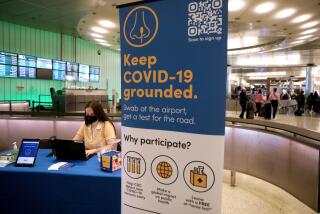How accurate are airport luggage scales?
- Share via
Now that most airlines charge up to $45 to check a bag, air travelers worry about stuffing as much as possible into one bag without exceeding the 50-pound weight limit.
Bags that exceed the 50-pound limit incur an additional fee of up to $100.
But how accurate are the scales used by the airlines? That depends on the airport.
The latest inspection report from the Los Angeles County Weights and Measures Bureau found that 86% of the scales tested at Los Angeles International Airport were accurate to within one-tenth of a pound.
The bureau tests the scales annually, using very precise weights.
If a scale is off by more than one-tenth of a pound in favor of the airline, bureau inspectors put the scale out of service until it is repaired. If a scale is off in favor of the passenger, it can still be used but must be repaired within 30 days, said Jeff Humphreys, deputy director of the bureau.
At LAX, only six scales registered bags to be heavier than they really were, while 23 scales gave readings that showed the bags were lighter than they really were, according to a report by the county bureau.
At Long Beach Airport, 62% of the scales were found to be accurate during the most recent bureau inspection. But most of the flawed scales were inaccurate in favor of the passenger. Only two scales registered bags to be heavier than they really were, while four gave readings that were too light, according to the report.
At Bob Hope Airport in Burbank, 71% of the airline scales were found to be accurate, with one scale being inaccurate to the disadvantage of the passengers and one scale inaccurate to the advantage of the fliers, according to bureau records.
Humphreys said airlines’ scales have become more accurate in the last five years, since the bureau hired more inspectors and began inspecting annually instead of once every three years.
“Once we made a concerted push to get through to all the terminals more often, we brought the level of accuracy up,” he said.
• Program zips pilots through security
Under a new program aimed at speeding up airport security lines, airline pilots can now zip through security checkpoints at Chicago’s O’Hare International Airport without being scanned or searched like everyone else.
The trial program is intended to take pilots out of the screening lines to speed the security process for all travelers.
The program comes as federal officials, airlines and travel trade groups call for a new security screening process that creates faster security lanes for pre-screened, frequent travelers and airline crew members while keeping close scrutiny on high-risk passengers.
At O’Hare, TSA officials are using laptop computers to verify the identification of pilots and their employment status by checking multiple photo IDs and real-time airline data. The pilots then go through a special screening lane, where they avoid full-body scanners and pat-down searches. Pilots even get to keep their shoes and jackets on, and no one searches their carry-on bags.
“It was a very pleasurable experience. I didn’t have to disrobe,” Alaska Airlines pilot Sean Cassidy told the Chicago Tribune.
Testing for the program is expected to be expanded to other airports across the country starting this month.
• Insurers offer bedbug policies
As the hotel bedbug problem continues to creep across the country, several insurance companies have begun to offer bedbug policies.
New York-based Willis North America offers a bedbug insurance policy that covers the costs of decontamination, profit losses due to business interruption and crisis management help, among other services.
Aon Risk Solutions in Chicago and NSM Insurance Group in Pennsylvania also recently announced bedbug insurance policies.
Bedbugs began to grow as a problem in hotels in East Coast cities a few years ago and have been creating headaches for the hospitality industry across the country.
John Lafakis, program manager for Willis’ Bed Bug Infestation Recovery Insurance, warned: “Any bedbug outbreak, big or small, has the potential to damage an organization’s reputation or brand, resulting in financial loss.”
More to Read
Inside the business of entertainment
The Wide Shot brings you news, analysis and insights on everything from streaming wars to production — and what it all means for the future.
You may occasionally receive promotional content from the Los Angeles Times.










